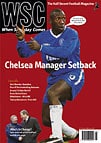 It's not just the English who have trouble with players breaking curfew or wayward young stars, writes Justin McCurry
It's not just the English who have trouble with players breaking curfew or wayward young stars, writes Justin McCurry
Though the media spotlight was firmly on the squad of Japan players preparing for their second World Cup qualifying match, away to Singapore at the end of March, it was difficult not to think, too, of the players who had been left behind. Their omission was not down to injury, poor form, family crises or intransigent club managers, but a badly timed bout of the “English disease” of training-camp indiscipline.
The national team’s already embattled coach, Zico, had been forced to drop eight of his players for choosing the eve of a warm-up fixture against Malaysia the previous month to indulge in a spot of binge drinking. Details of their night of shame are sketchy, but according to one (unchallenged) version in a weekly gossip magazine, the well refreshed players hurled sushi at one another, harassed other diners and, most serious of all, groped a waitress.
The Brazilian, “heartbroken” by his players’ behaviour, has been likened to an absent parent compared with the in-your-face approach to man-management of his predecessor, the Frenchman Philippe Troussier. Zico’s explanation for the punishments was doubtless made with those critics in mind. “This is my way of doing it,” he said. “I do not know what my predecessor did, but I am not going to go around the rooms of every player at 11 o’clock at night to see if they are in bed. That’s just not my way.”
Among the players who missed out on the humidity of a Singapore spring was Yoshito Okubo. On reflection, though, it was probably too much to ask of the Cerezo Osaka striker to be tucked up in bed before lights-out with a mug of Ovaltine. Since making his professional debut four seasons ago as a suede-headed high school graduate, Okubo has proved to a grateful domestic game that there is life after Hidetoshi Nakata, Shinji Ono and Junichi Inamoto.
After a mediocre debut 2001 season in which Cerezo were relegated to the second division, the following year Okubo was the inspiration behind their immediate return to the top flight. Before football writers were prepared to accept they had a genuine talent in their midst, they set Okubo a test: could he be similarly prolific in the first division? His response was 16 league goals in 24 games and the first of 14 senior international appearances.
Short and stocky, with well worn features and composure in front of goal that belie his 21 years, Okubo has inevitably invited comparisons with Wayne Rooney. Like Rooney, he is often described as his country’s great new hope; and like Rooney, his game is a blend of breathtaking skill and youthful excess.
His training-camp fracas was a slight variation on a theme that has become a feature of Okubo’s recent career. He is more familiar with the red card than colleagues ten years his senior, having apparently learned how to deal with match officials at the Roy Keane school of diplomacy. His transgressions are timed to comic perfection.
On the day he was named Asia’s 2003 young player of the year, Okubo received his marching orders against South Korea in the East Asian Championship. Last October, he was chosen by Japan Railways as the acceptable face of the nation’s youth, appearing in posters at train stations reminding teenagers to behave themselves on their way to and from school. The credibility of his message was stretched to breaking point when he received his 13th and 14th yellow cards of the season and had to sit out Cerezo’s final two league games.
His questionable temperament aside, Okubo could be crucial to Japan’s 2006 hopes as Zico struggles to find a regular goalscorer. That much was clear a few weeks ago when Japan’s Under-23s, without the “rested” striker, made heavy work of the first four of their six Olympic qualifying matches, against Bahrain, the United Arab Emirates and Lebanon.
Okubo appeared in the final two matches, scoring three goals to ensure Japan’s qualification for the Athens Games: not bad for a player whose last competitive appearance had been on New Year’s Day. Provided he learns to behave himself, the enfant terrible of Japanese football could have the same galvanising effect on the senior squad. Steering clear of sushi restaurants after dark would be a good start.
From WSC 207 May 2004. What was happening this month